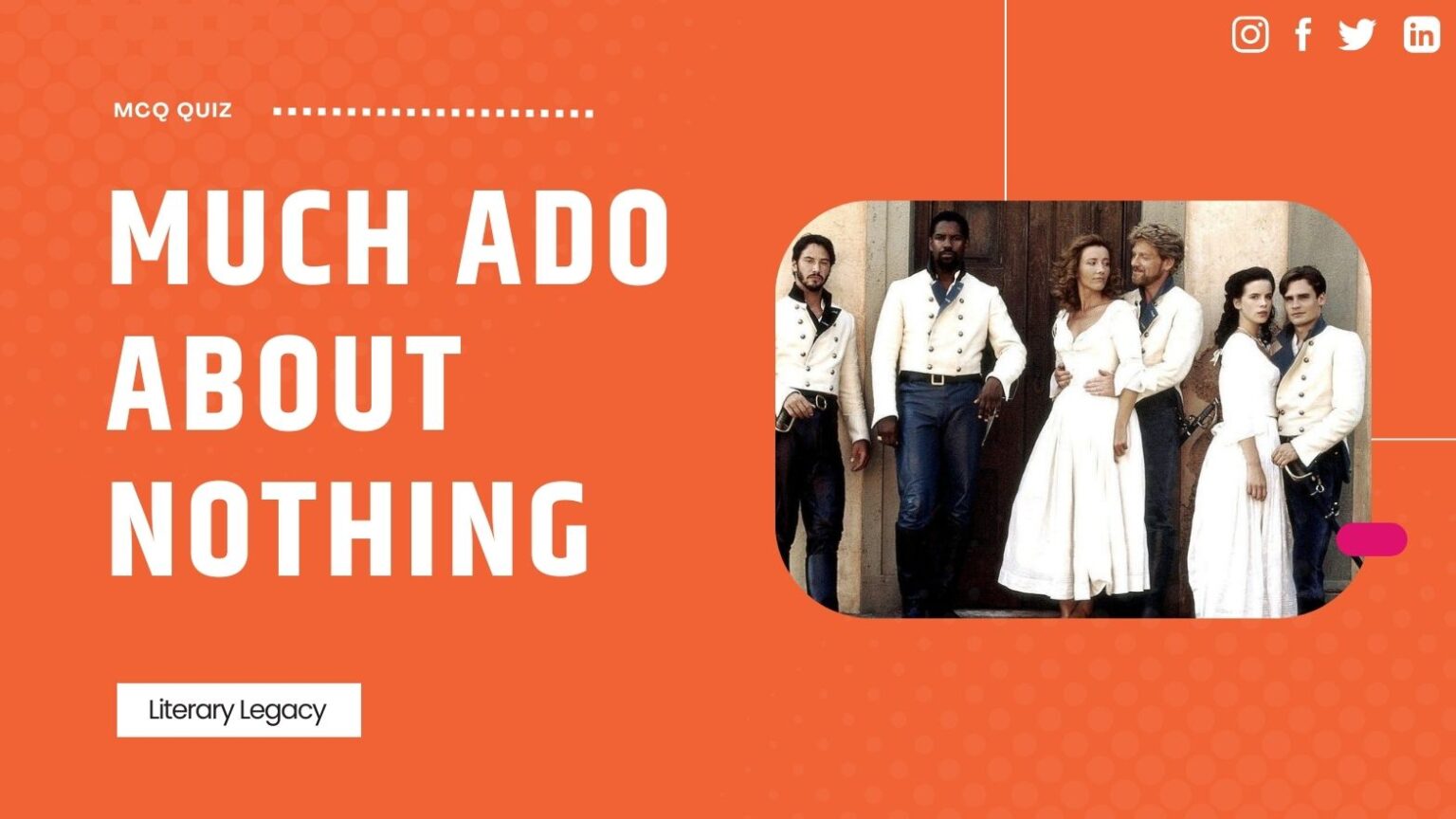1. What is the relationship between Beatrice and Hero?
Choices
A) Sisters
B) Friends
C) Aunt and niece
D) Cousins
Answer: (D)
Cousins
Beatrice is Hero’s cousin, as she is the daughter of Hero’s father, Antonio.
2. Which character primarily causes trouble for the other characters?
Choices
A) Don John
B) Benedick
C) Antonio
D) Claudio
Answer: (A)
Don John
Don John, being sullen and bitter, is responsible for creating conflict and disrupting the happiness of the other characters.
3. What is Claudio’s response when he believes Hero has been unfaithful?
Choices
A) He accuses her of lechery at the altar.
B) He confronts Hero immediately.
C) He seeks revenge on Don John.
D) He remains silent.
Answer: (A)
He accuses her of lechery at the altar.
Claudio publicly humiliates Hero by accusing her of infidelity on their wedding day due to his mistaken belief.
4. What does Leonato decide to do after Claudio’s accusation against Hero?
Choices
A) He forbids the wedding.
B) He pretends Hero died of shock.
C) He disowns Hero.
D) He forces Claudio to flee Messina.
Answer: (B)
He pretends Hero died of shock.
Leonato chooses to pretend that Hero has died from the shock and grief of being accused unfairly.
5. What plan do Claudio and Don Pedro witness that leads Claudio to believe Hero is unfaithful?
Choices
A) They overhear a conversation about Hero.
B) They find a letter written by Hero.
C) They see Hero with another man.
D) They watch Borachio with Margaret at Hero’s window.
Answer: (D)
They watch Borachio with Margaret at Hero’s window.
Claudio mistakenly believes that he has seen Hero being disloyal when he observes Borachio with Margaret.
6. How do Beatrice and Benedick initially relate to each other?
Choices
A) As rivals.
B) As lovers.
C) As old friends.
D) As enemies.
Answer: (A)
As rivals.
Beatrice and Benedick engage in a playful exchange of witty insults, portraying their rivalry.
7. Who is responsible for overhearing Borachio bragging about his deception?
Choices
A) Leonato
B) Benedick
C) Claudio and Don Pedro
D) The night watchmen
Answer: (D)
The night watchmen
The local night watchmen overhear Borachio, leading to the revelation of Hero’s innocence.
8. What punishment does Leonato impose on Claudio for his treatment of Hero?
Choices
A) He requires Claudio to confess to Hero.
B) He demands that Claudio marry another girl.
C) He banishes Claudio from Messina.
D) He orders Claudio to build a statue of Hero.
Answer: (D)
He orders Claudio to build a statue of Hero.
Leonato instructs Claudio to publicly acknowledge Hero’s innocence and to marry a woman who resembles her.
9. What is the emotional state of Don John throughout the play?
Choices
A) Sullen and bitter.
B) Joyful and hopeful.
C) Indifferent and detached.
D) Happy and content.
Answer: (A)
Sullen and bitter.
Don John is portrayed as sullen and bitter, contributing to his disruptive actions towards others.
10. What motivates Hero to remain hidden after her public humiliation?
Choices
A) A wish to forget the incident.
B) Fear of public scrutiny.
C) Avoidance of her father.
D) Desire for revenge.
Answer: (B)
Fear of public scrutiny.
Hero chooses to remain hidden to avoid the shame and repercussions of her alleged infidelity.
11. What is one notable trait of Beatrice’s personality?
Choices
A) She is uninterested in social interactions.
B) She is incredibly serious and never jokes.
C) She has a sharp tongue and enjoys mocking others.
D) She is shy and reserved.
Answer: (C)
She has a sharp tongue and enjoys mocking others.
Beatrice is known for her wit and her tendency to mock others with elaborate jokes.
12. What leads Claudio to despair and seek revenge?
Choices
A) A slanderous accusation against Hero.
B) His promotion by Don Pedro.
C) Beatrice’s rejection of his love.
D) Benedick’s mockery of his feelings.
Answer: (A)
A slanderous accusation against Hero.
Claudio’s suspicions about Hero’s faithfulness lead him to take drastic actions out of despair.
13. How is Don Pedro characterized in the play?
Choices
A) He is a villain motivated solely by jealousy.
B) He is a nobleman who readily trusts others.
C) He displays kindness but is also quick to suspect others.
D) He is characterized by his indifference to social issues.
Answer: (C)
He displays kindness but is also quick to suspect others.
Don Pedro is generous and courteous but quick to believe the worst about others.
14. What is the relationship between Hero and Beatrice?
Choices
A) Cousins
B) Aunt and niece
C) Best friends
D) Sisters
Answer: (A)
Cousins
Hero and Beatrice are cousins in the story.
15. What does Dogberry often do in his speech?
Choices
A) Use exactly the wrong word to convey meaning.
B) Use complex legal jargon correctly.
C) Employ simple and straightforward language.
D) Flatter the noble characters around him.
Answer: (A)
Use exactly the wrong word to convey meaning.
Dogberry is known for his humorous misuse of words which adds a comic element to the play.
16. What motivates Don John’s actions throughout the play?
Choices
A) His aspiration to become a nobleman.
B) His jealousy of Don Pedro’s status.
C) His desire to be loved by others.
D) A wish to help Claudio win Hero.
Answer: (B)
His jealousy of Don Pedro’s status.
Don John is motivated by envy and a desire to disrupt the happiness of others due to his low social standing.
17. What is Claudio’s view of Hero after he is deceived by Don John?
Choices
A) He praises her loyalty and faithfulness.
B) He seeks to comfort her during her distress.
C) He believes she has been unfaithful.
D) He is indifferent to her feelings.
Answer: (C)
He believes she has been unfaithful.
Claudio quickly jumps to conclusions about Hero’s fidelity, leading him to believe she has betrayed him.
18. What aspect of Benedick and Beatrice’s relationship is highlighted throughout the play?
Choices
A) Their mutual indifference to love.
B) Their shared desire for political power.
C) Their unwillingness to engage in conflict.
D) Their witty banter and battle of wits.
Answer: (D)
Their witty banter and battle of wits.
Benedick and Beatrice are known for their playful banter and sharp exchanges, which portray a complex relationship.
19. What role does Margaret play in the deception of Claudio?
Choices
A) She tries to stop the misunderstanding.
B) She encourages Hero to betray Claudio.
C) She unknowingly aids Don John’s plans.
D) She actively conspires with Don Pedro.
Answer: (C)
She unknowingly aids Don John’s plans.
Margaret unwittingly participates in the ploy that leads Claudio to believe Hero is unfaithful.
20. What quality is most essential for a character like Benedick according to the ideals of social grace?
Choices
A) Emotional vulnerability and openness.
B) The ability to make witty and effortless remarks.
C) A rejection of social norms and traditions.
D) Politeness and adherence to monotony.
Answer: (B)
The ability to make witty and effortless remarks.
Characters like Benedick are expected to exemplify wit and ease in social interactions, adhering to the ideals of courtiers.
21. What are Claudio’s main motivations for allowing Don Pedro to woo Hero on his behalf?
Choices
A) Claudio wants to create a romantic surprise for Hero.
B) Claudio trusts Don Pedro’s judgment and wants to maintain his favor.
C) Claudio is too shy to approach Hero himself.
D) Claudio believes Don Pedro is a better suitor.
Answer: (B)
Claudio trusts Don Pedro’s judgment and wants to maintain his favor.
Claudio’s decision stems from the need to maintain his social standing and favor with Don Pedro.
22. What is the effect of Claudio rejecting Hero during the wedding ceremony?
Choices
A) It represents a common misunderstanding of love.
B) It leads to a joyful reunion for all characters.
C) It illustrates the importance of women’s honor in society.
D) It showcases the ease with which men can regain their honor.
Answer: (C)
It illustrates the importance of women’s honor in society.
Claudio’s rejection highlights the severe consequences of losing a woman’s honor during Shakespeare’s time.
23. Which theme is primarily explored through Benedick and Beatrice’s relationship?
Choices
A) The consequences of familial honor.
B) The impact of deception leading to unexpected love.
C) The power of honest communication in love.
D) The inevitability of social class struggles.
Answer: (B)
The impact of deception leading to unexpected love.
Their relationship is built on deceptions that ultimately lead them to fall in love.
24. What is the primary role of deception in the plot of Much Ado About Nothing?
Choices
A) It serves solely to cause chaos among characters.
B) It highlights the flaws in every character.
C) It is used both to promote and disrupt love.
D) It illustrates the power dynamics in friendship.
Answer: (C)
It is used both to promote and disrupt love.
Deception is a complex tool that characters use to influence their relationships.
25. How does the concept of honor differ between men and women in the play?
Choices
A) Both men and women’s honor is equally at risk in romantic pursuits.
B) Women’s honor is tied to their chastity, while men’s is linked to male alliances.
C) Men can reclaim their honor through public acknowledgment.
D) Honor for women is based on battlefield victories.
Answer: (B)
Women’s honor is tied to their chastity, while men’s is linked to male alliances.
In the play, women’s honor correlates with chastity, whereas men’s honor is related to friendships and combat.
26. What does Claudio’s line, ‘I wish him joy of her’, reveal about his character?
Choices
A) He is indifferent to Hero’s feelings.
B) He is supportive of romantic friendships.
C) He feels betrayed and is masking his resentment.
D) He is genuinely happy for Don Pedro.
Answer: (C)
He feels betrayed and is masking his resentment.
Claudio’s polite dismissal conceals his true feelings of betrayal and despair.
27. What outcome results from Leonato’s reaction to Claudio’s accusations against Hero?
Choices
A) It leads to a united reconciliation for the family.
B) It forces Claudio to abandon his pursuit of marriage.
C) It strengthens Hero’s social standing.
D) It causes Hero’s supposed death and temporary disgrace.
Answer: (D)
It causes Hero’s supposed death and temporary disgrace.
Leonato’s response contributes to Hero’s shaming and the misconception of her death.
28. Which character is responsible for instigating Claudio’s mistrust of Don Pedro?
Choices
A) Hero
B) Don John
C) Benedick
D) Leonato
Answer: (B)
Don John
Don John manipulates Claudio into believing he has been deceived by Don Pedro.
29. What does Benedick’s challenge to Claudio on Hero’s behalf indicate about societal norms?
Choices
A) Honor can only be reclaimed through personal relationships.
B) Men are judged by their ability to fight.
C) Women must fend for themselves in honor disputes.
D) Honor is irrelevant in romantic situations.
Answer: (B)
Men are judged by their ability to fight.
Benedick’s willingness to duel suggests that violence is a means of restoring honor among men.
30. What role do masks play in the interactions between characters at the masked ball?
Choices
A) They serve as protection against social judgment.
B) They symbolize the superficiality of social interactions.
C) They create an environment of complete trust.
D) They allow characters to reveal their true identities.
Answer: (B)
They symbolize the superficiality of social interactions.
The masks illustrate the theme of deception and the facades characters maintain in social settings.
31. What significant theme does the masked ball symbolize in the play?
Choices
A) The inevitability of marriage
B) Unity among characters
C) Emphasis on deceptions
D) Celebration of love
Answer: (C)
Emphasis on deceptions
The masked ball serves to highlight the deceptions that will later unfold in the story.
32. How do Claudio and Hero’s initial relationship develop?
Choices
A) As a simple case of love at first sight
B) Through mutual witty banter
C) Through an arranged marriage
D) With significant doubts and misunderstandings
Answer: (A)
As a simple case of love at first sight
Claudio and Hero experience a straightforward romance characterized by an immediate attraction.
33. What does Don John’s character primarily represent in the play?
Choices
A) A source of comic relief
B) The destructive nature of envy
C) A mentor for Claudio
D) Harmony between lovers
Answer: (B)
The destructive nature of envy
Don John’s envy motivates him to create chaos and deception among the other characters.
34. What method do Beatrice and Benedick use to express their feelings for each other?
Choices
A) Witty insults and banter
B) Public declarations
C) Secret letters
D) Direct confession
Answer: (A)
Witty insults and banter
Beatrice and Benedick engage in a ‘merry war’ of wits that masks their real attraction.
35. What ultimately catalyzes the revelation of Hero’s innocence?
Choices
A) Confessions from Borachio
B) A rescue by Benedick
C) A confrontation with Claudio
D) A plea from Beatrice
Answer: (A)
Confessions from Borachio
Borachio’s bragging reveals the truth about Hero’s alleged infidelity, uncovering her innocence.
36. Which character expresses frustration with the societal expectations of women during the play?
Choices
A) Claudio
B) Hero
C) Beatrice
D) Margret
Answer: (C)
Beatrice
Beatrice openly declares her frustration with the constraints placed on women in her society.
37. How does the relationship between Hero and Claudio change throughout the play?
Choices
A) It grows stronger without conflicts.
B) It is marked by public trust and loyalty.
C) It results in an unresolvable rivalry.
D) Deception initially divides them and later unites them.
Answer: (D)
Deception initially divides them and later unites them.
Their relationship is first threatened by deception but ultimately is restored through truth.
38. What role does deception play in the relationship between Hero and Claudio?
Choices
A) It has no significant impact on their relationship.
B) It divides them and later reconciles them.
C) It is used to manipulate public opinion.
D) It serves only to create misunderstandings.
Answer: (B)
It divides them and later reconciles them.
Deceptions crafted by Don John and later by Beatrice and Benedick oscillate between division and unity for the couple.
39. What does Beatrice reveal about her past feelings for Benedick?
Choices
A) She still wishes to marry him.
B) She has never loved him.
C) She once loved him but ended the relationship.
D) She detests him completely.
Answer: (C)
She once loved him but ended the relationship.
Beatrice’s backstory indicates that she once had feelings for Benedick that were complicated by his behavior.
40. How does the play ultimately resolve the central conflicts?
Choices
A) Through trials and legal proceedings.
B) By means of a final uniting deception.
C) With a series of public apologies.
D) With a royal decree for peace.
Answer: (B)
By means of a final uniting deception.
The final revelation of the truth regarding Hero leads to the resolution of conflicts through a uniting deception.



